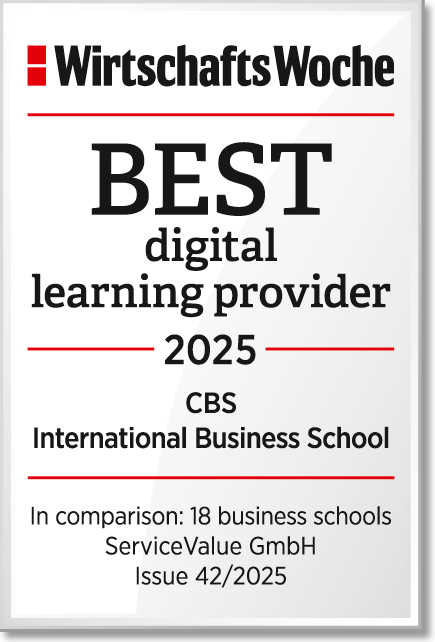International Management (MBA) 60 ECTS
Accelerate Your Career with a Fast Track MBA at CBS!

Study International Management Fast Track (MBA) – Earn Your MBA in One Year in Germany!
Do you want to earn your Master of Business Administration (MBA) in just one year? The Fast Track MBA in International Management at CBS in Cologne offers you exactly that opportunity. Inspired by American MBA programmes, this accelerated curriculum allows you to earn a fully accredited MBA degree in a shorter time frame—ideal for those who want to quickly achieve one of the most prestigious academic titles.
With 60 ECTS credits, the programme covers all essential business administration topics typically found in an MBA. If you already have relevant work experience, the Fast Track MBA at CBS University of Applied Sciences is the perfect choice for you.
This intensive MBA programme is designed especially for graduates from non-business disciplines who want to broaden their expertise and enhance their career prospects.
If you have previously studied in a different field and feel that expanding your business knowledge would help you advance your career, this internationally oriented MBA will prepare you for senior management roles.
Even if you already have a business background, the Fast Track MBA allows you to refresh your knowledge, specialise in key areas, and accelerate your career development—all without interrupting your professional trajectory for too long.
*Tuition fees differ for EU and non-EU students. For the specific fees please check the tuition fees information page. Status: April 2025.

Curriculum
Product Development & Innovation
3
ECTS
- Transform customer insights into innovative products that address real market needs
- Lead through the development lifecycle from ideation to market launch
- Apply innovative concepts to solve complex problems and create user-centered solutions
- Evaluate market opportunities and validate product-market fit
Financial Investment Analysis
6
ECTS
- Analyse business models and annual reports of international companies
- Use relevant key ratios to evaluate companies
- Speak the language of management consultants, investors and private equity firms
- Use your knowledge to develop investment decisions and strategies
Applied AI & Digital Competence
6
ECTS
- Build future-proof digital competencies such as AI collaboration skills
- Learn to apply frontier AI to real business challenges — not just theory
- Shape a professional narrative that signals: “I am an AI-ready talent for global companies in Europe”
- Acquire modern technology skills that are relevant for day to day business
Value Creation through Marketing & Branding
6
ECTS
- Develop value propositions that differentiate offerings in competitive markets
- Create brand experiences that strengthen relationships and build competitive advantages
- Develop strategic frameworks that position marketing and branding as key drivers of customer value
- Explore the impact of marketing and branding on customer loyalty, profitability, and sustained growth
Storytelling with Data & Statistics
6
ECTS
- Master statistical fundamentals and analytical techniques to extract meaningful insights from complex datasets
- Craft compelling data narratives that transform numbers into persuasive stories for diverse audiences
- Design visualisations and presentations that make statistical findings accessible and drive decision-making
Business Model Mapping & Sustainability Evaluation
6
ECTS
- Map the components of real companies onto a business model framework
- Understand the context and governance of companies
- Evaluate sustainability and corporate responsibilities in the various business model components
- Develop strategies to further develop business models towards future requirements
Managerial Economics
6
ECTS
- Learn how to analyse markets and make predictions, developing a comprehension of economic systems
- Set up projects to solve real problems and use project reviews
- Master verbal, graphical, and mathematical ways to address economic and managerial problems
- Understand economic tools and theoretical approaches such as supply and demand, market structures, and game theory
Master Thesis (compact)
15
ECTS
- Demonstrate mastery of your field by conducting independent research that addresses a relevant business topic
- Apply strategic frameworks and methodologies to analyse complex problems and develop evidence-based solutions
- Synthesise knowledge from multiple disciplines to generate insights and recommendations
- Communicate findings professionally through rigorous academic writing
Advanced Business Strategy
6
ECTS
- Define strategic purpose and goals
- Evaluate feasibility of achieving strategic goals through internal and external analysis
- Formulate competitive strategies
- Design corporate growth strategies to achieve long-term profitability
Why CBS UNIVERSITY
Your path to CBS
The Getting started Your studies at CBS University of Applied Sciences are so individually Like yourself — and at the same time uncomplicated designed. With our easy to use Online application process Can you yourself cushy of everywhere From apply, completely without Numerus clausus.
Instead of staring Admission requirements Waiting for you with us is a personal selection processthat is your strengths and focuses on potential. Regardless of whether you are looking for dual, part-time or full-time studies Decide, the CBS University offers you the optimal connection of Theory and practice.

Admission requirements
Die Zugangsvoraussetzungen für dein MBA-Studium an der CBS University of Applied Sciences variieren je nach Studiengang .
Deadlines
The application deadline is year round open, even before you graduate from high school. For dual study programs, you should sufficient lead time Plan so that we can find your suitable practice partner. The start of studies is flexible: in the winter semester or, for selected programs, also in the summer semester. One early candidature is particularly important for limited study places secure and apply for any necessary visas in good time.
funding
A dual or part-time study Is often used by the Practice partner financed, which is also a valuable occupational provides accompaniment. A full-time study On the other hand, can be achieved by numerous Funding opportunities like BAföG or stipends Personalize to give you an optimal connection of personal Development and academic To make the future possible.
YOUR APPLICATION PROCESS
To ensure a quick and straightforward applicationprocess, we have made it as simple as possible! In just a few steps, you canapply for your business administration (MBA) degree – online, flexibly,and without long waiting times.
Maximal Praxisah
Through our approach, theory and practice to connect, you can use the knowledge you have learned during your studies upfront apply and gain valuable insights into the real world of work.
Business Projects
As part of the business projects at CBS International Business School, students have the opportunity to work together with renowned undertakings at realistic projects to work. This practice-oriented Form of teaching combines theoretical knowledge with specific economic issues and provides deep insights into professional processes.
Business cooperation
Thanks to a network of via 1,300 established companies out various industries Do students benefit from exclusive insights into the working world. These collaborations not only open up exciting perspectives, but also promote development important contacts and offer sustainable career opportunities.
Internship/professional experience
Whether in the form of Compulsory internships, which are an integral part of many degree programs, or through the integration of professional experience into dual and part-time programs: You can your knowhow directly in the real working world apply.
Broschüre sichern!
Melde dich zu unserem Newsletter an & erhalte spannende News rund um unsere Hochschule. Ob neue Studiengänge, Events oder Tipps für deine Karriere – mit uns verpasst du nichts!

Ablauf und Präsenzzeiten deS Studiums
Amet, consectetur adipiscing elit, sed do eiusmod tempor incididunt ut labore et dolore magna aliqua. Ut enim ad minim veniam, quis nostrud exercitation ullamco laboris nisi. Amet, consectetur adipiscing elit, sed do eiusmod tempor incididunt ut labore et dolore magna aliqua. Ut enim ad minim veniam, quis nostrud exercitation ullamco laboris nisi.
%201%20(2).jpg)
%201%20(2).jpg)
Inspiration and Impact – What Our Alumni Say
Let yourself be inspired by the experiences of our alumni and discover how the MBA degree at CBS has shaped their professional and personal development.
FAQ: The Most Important Questions About theMaster of Business Administration (MBA) Fast Track
Here you will find answers to all the key questionsabout your MBA programme. If you have any further questions, feel free tocontact us at any time.
Is my International Management MBA recognised?
Yes, all CBS University of Applied Sciences master’s degrees are fully accredited and internationally recognised.
Can I pursue a PhD after completing the Fast Track MBA?
Yes, under certain conditions, the Fast Track MBA qualifies you for doctoral studies.
What salary can I expect after completing the International Management MBA?
After completing your MBA in International Management, you can expect competitive salary prospects.
Earnings vary based on industry, company size, location, and work experience. According to mystipendium.de, the average starting salary for graduates with a Bachelor’s in International Management is approximately €48,000 per year.
With increasing work experience and senior management roles, salaries can rise significantly.
What are the career opportunities with an International Management MBA?
The comprehensive curriculum prepares graduates for a wide range of career paths, including:
• Consulting
• Project Management
• Marketing & Sales
• General Management
• Product Development
• Research
• Administration
What are the admission requirements for the Fast Track MBA?
To apply for an MBA at CBS University of Applied Sciences, you must have:
• A first academic degree from a recognised German or international university, university of applied sciences, or business academy.
• A minimum of 180 ECTS credits from your undergraduate studies.
• At least one year of professional work experience to demonstrate practical business expertise.
All application documents must be submitted in English and will be carefully reviewed by the CBS Admissions Office to ensure all requirements are met.
Where can I study the Master of Business Administration (MBA)?
You can complete the Master of Business Administration (MBA) in cologne. The city offers a dynamic economic environment with numerous companies, networking opportunities and an international community — ideal for your career in management.
How long does an MBA Fast Track programme take?
The programme lasts two semesters (12 months) and is offered full time.
Any questions? We're here to help
Do you have any questions about our bachelor's or master's degree programs? Our Student Advisory team is here to support you! Schedule your personal consultation—online or in person—for tailored, non-binding guidance on finding the right study program for you.


























